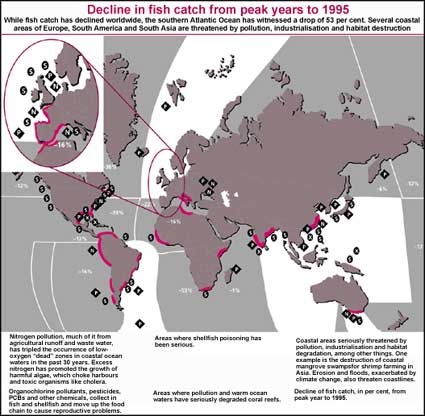Call of the ocean
 Not only do oceans cover more than two-thirds of the Earth's surface they play a crucial role in the chemical and biological balance of life on the planet. They are vital to our food security, commerce and transportation. But human activity has troubled the oceans' health. Many fish species have been harvested to a point that their populations are threatened. The coastal mangrove forests of Asia have been destroyed by shrimp farming. The habitats of marine mammals and fish have been degraded severely, with pollution responsible for the mass deaths of fish, mammals and corals. Several coastal areas have witnessed shellfish poisoning. Organochlorine pollutants, pesticides, polychlorinated biphenyls (PCBs) and a range of other pollutants accumulate within fishes later moving up the food chain to cause reproductive disorders. Climate change has also endangered marine species. If the invaluable resources from the oceans are to be conserved, then humankind has its job cut out for the coming millennium.
Not only do oceans cover more than two-thirds of the Earth's surface they play a crucial role in the chemical and biological balance of life on the planet. They are vital to our food security, commerce and transportation. But human activity has troubled the oceans' health. Many fish species have been harvested to a point that their populations are threatened. The coastal mangrove forests of Asia have been destroyed by shrimp farming. The habitats of marine mammals and fish have been degraded severely, with pollution responsible for the mass deaths of fish, mammals and corals. Several coastal areas have witnessed shellfish poisoning. Organochlorine pollutants, pesticides, polychlorinated biphenyls (PCBs) and a range of other pollutants accumulate within fishes later moving up the food chain to cause reproductive disorders. Climate change has also endangered marine species. If the invaluable resources from the oceans are to be conserved, then humankind has its job cut out for the coming millennium.
Related Content
- State of the Climate in Asia 2024
- Riders on the storm: how debt and climate change are threatening the future of small island developing states
- Contributions of regional seas conventions and action plans to a healthy ocean
- What Happened in CoP26
- Impacts of plastic pollution on freshwater aquatic, terrestrial and avian migratory species in the Asia and Pacific Region report
- No time to lose, says Sunita Narain on the new IPCC report
